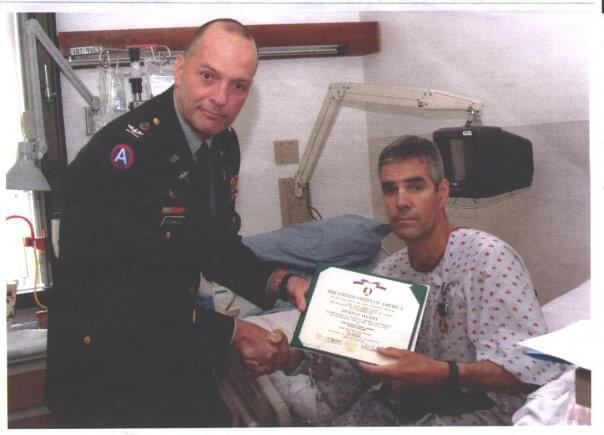Paralympian and former Army platoon leader, 1st Lt. Melissa Stockwell, 42, deployed to Iraq in March 2004 with the 27th Main Support Battalion, 1st Cavalry Division, after enlisting two years earlier. But after just three weeks in Baghdad, her life would never be the same.
At only 24 years old, Stockwell lost her left leg in a roadside bomb explosion. This made her the first female soldier to lose a limb in the Iraq War. She was medically retired in 2005 and awarded both the Bronze Star Medal and a Purple Heart: the military decoration bestowed to service members wounded or killed in action.
“Definitely, nothing I’d ever thought I would get, but I am proud to have a Purple Heart,” said Stockwell, who said at first, she did not feel worthy of the award.
Purple Heart recipients like Stockwell were honored yesterday on National Purple Heart Day, the annual remembrance day for service members injured or killed in the line of duty, as those who earned the nation’s oldest military decoration continue to reflect on the meaning of their sacrifice.
Army Sgt. 1st Class Joe Bowser, 62, recalled sitting next to Stockwell on the plane that brought them back stateside to receive treatment at Walter Reed National Military Medical Center. Bowser, who alternated between active duty and a Connecticut reserve unit beginning in 1980, deployed to Iraq in January 2004. He too would receive a Purple Heart after his compound in Balad, Iraq, was hit by rocket fire in April that year, leading to the loss of his right leg below the knee.

“For me it was just an honor to serve my country, I wasn’t looking for ribbons, I wasn’t looking for awards,” said Bowser, who later played for the National Amputee Hockey Team, winning a silver medal at an international competition in 2007.
After separating, Stockwell also transitioned to an athletic career. She competed as a swimmer at the 2008 Beijing Paralympics, in paratriathlon at both the 2016 Rio Games, where she won a bronze medal, and the 2020 Tokyo Games.
“It was this full circle moment of losing my leg in Iraq, defending our country to now representing our country on the world’s biggest stage,” said Stockwell, who is actively training to compete at future Paralympics.
If that was not enough to keep her busy, Stockwell and her husband helped found a nonprofit called Dare2tri, which uses sport to help empower individuals with disabilities. She also is working alongside companies like ChapStick, which is partnering with Operation Gratitude, a nonprofit creating care packages for the military community.
The National Purple Heart Honor Mission, a nonprofit dedicated to honoring the sacrifice of service members who have received the Purple Heart, held a celebration yesterday at the birthplace of the decoration, Gen. George Washington’s historic headquarters in Newburgh, New York. The Honor Mission also helped establish the National Purple Heart Hall of Honor, located in nearby New Windsor, NY, which manages a national registry and preserves the stories of the nearly two million Purple Heart recipients.
“Today we come together to honor the service and sacrifice of those great Americans on National Purple Heart Day, and recommit ourselves to ensuring a whole new generation of Americans remember their courage and never forget,” said retired Army Col. Russ Vernon, the organization’s executive director, during the ceremony. Vernon served from 1976 until retiring in 2004 from the Army National Guard.
The creation of the Purple Heart award, and the August 7 date on which the remembrance day originated, goes back to 1782 when Washington created and presented its predecessor, the Badge of Military Merit, to three service members, said Col. Vernon. The award was revitalized as the modern-day Purple Heart in 1932 on the bicentennial of George Washington’s birth.
“It’s the award that no one every wants to receive,” said Vernon in an interview with Military Times, later adding “although they did not want to receive the Purple Heart, they’re proud of it.”
That mindset remains true for Purple Heart recipients like retired Army Col. Thomas “TC” Smith who was injured during his service in Vietnam.
“It was just like all hell broke loose. And that’s when I was shot,” said Smith, 74, in an interview.
Smith enlisted in the Army in 1967, following in his father’s footsteps, but in 1971 during a reconnaissance scouting mission in Vietnam with the 271st Aviation Company his helicopter received intense enemy fire, including a round that hit him in the leg.
Receiving the Purple Heart can be a “weight that you carry around with you,” shared retired Spc. Connie Johnson, 38, a native of South Dakota.
She served in the Army’s 101st Airborne Division as a military police officer and deployed to Iraq in February 2003, but in January the next year she took shrapnel to her head and neck when her truck hit an IED on a routine security mission.
Johnson discussed in an interview with Military Times that for service members with a Purple Heart award, like herself, National Purple Heart Day can be rather “heavy,” but serves as an opportunity for them to reflect on their personal journey.
Jonathan is a staff writer and editor of the Early Bird Brief newsletter for Military Times. Follow him on Twitter @lehrfeld_media





